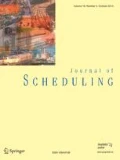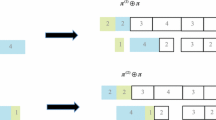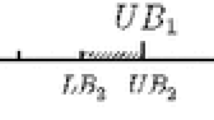Abstract
The paper presents a dynamic programming approach for the two-machine nonpreemptive job-shop scheduling problem with the total weighted late work criterion and a common due date \((J2\,|\,n_i \le 2,d_i = d\,|\,Y_w )\), which is known to be NP-hard. The late work performance measure estimates the quality of an obtained solution with regard to the duration of late parts of tasks not taking into account the quantity of this delay. Providing a pseudopolynomial time method for the problem mentioned we can classify it as binary NP-hard.
Similar content being viewed by others
References
Blazewicz, J., “Scheduling preemptible tasks on parallel processors with information loss,” Recherche Technique et Science Informatiques, 3(6), 415–420 (1984).
Blazewicz, J., K. Ecker, E. Pesch, G. Schmidt, and J. Weglarz, Scheduling Computer and Manufacturing Processes. 2nd edn. Springer, Berlin, Heidelberg, New York, 2001.
Blazewicz. J. and G. Finke, “Minimizing mean weighted execution time loss on identical and uniform processors,” Information Processing Letters, 24, 259–263 (1987).
Blazewicz, J., E. Pesch, M. Sterna, and F. Werner, “Open shop scheduling problems with late work criteria,” Discrete Applied Mathematics, 134, 1–24 (2004).
Blazewicz, J., E. Pesch, M. Sterna, and F. Werner, “The two-machine flow-shop problem with weighted late work criterion and common due date,” European Journal of Operational Research, 165(2), 408–415 (2005).
Brucker, P., Scheduling Algorithms. 2nd edn. Springer, Berlin, Heidelberg, New York, 1998.
Garey, M. R. and D. S. Johnson, Computers and Intractability. W.H. Freeman and Co., San Francisco (1979).
Jackson, J. R., “An extension of Johnson’s results on job shop scheduling,” Naval Research Logistics Quarterly, 3, 201–203 (1956).
Johnson, S. M., “Optimal two- and three-stage production schedules with setup times included,” Naval Research Logistics Quarterly, 1, 61–68 (1954).
Jozefowska, J., B. Jurisch, and W. Kubiak, “Scheduling shops to minimize the weighted number of late jobs,” Operation Research Letters, 16(5), 277–283 (1994).
Leung, J. Y. T., “Minimizing total weighted error for imprecise computation tasks and related problems,” in: J. Y. T. Leung (ed.), Handbook of Scheduling: Algorithms, Models, and Performance Analysis. CRC Press, Boca Raton, 2004; Chapter 34:1–16.
Pinedo, M. and X. Chao, Operation Scheduling with Applications in Manufacturing and Services. Irwin/McGraw-Hill, Boston (1999).
Potts, C. N. and L. N. van Wassenhove, “Single machine scheduling to minimize total late work,” Operations Research, 40(3), 586–595 (1991).
Sterna, M., Problems and Algorithms in Non-Classical Shop Scheduling. Scientific Publishers of the Polish Academy of Sciences, Poznan (2000).
Sterna, M., Late Work Scheduling in Shop Systems. Publishing House of Poznan University of Technology, Poznan (2006).
Author information
Authors and Affiliations
Corresponding author
Additional information
M. Sterna has been supported by a KBN grant.
F. Werner has been supported by INTAS (project 03-51-5501).
Rights and permissions
About this article
Cite this article
Blazewicz, J., Pesch, E., Sterna, M. et al. A note on the two machine job shop with the weighted late work criterion. J Sched 10, 87–95 (2007). https://doi.org/10.1007/s10951-006-0005-5
Published:
Issue Date:
DOI: https://doi.org/10.1007/s10951-006-0005-5




